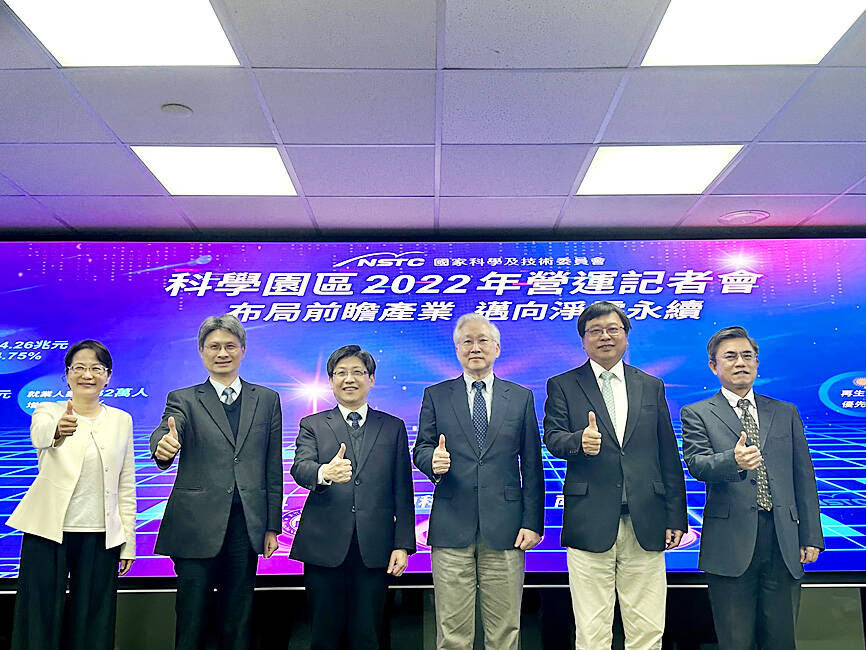The nation’s three major science parks posted record combined revenue of NT$4.27 trillion (US$139.3 billion) for last year, up 14.75 percent year-on-year, the National Science and Technology Council said in a report yesterday.
The council attributed the robust performance to a recovery in consumption after experiencing three years of COVID-19 curbs, as well as steady sales increases driven by semiconductor demand for emerging applications such as artificial intelligence of things, 5G and high-performance computing.
The Hsinchu Science Park (新竹科學園區) saw revenue rise 1.59 percent annually to NT$1.61 trillion, and the Central Taiwan Science Park (中部科學園區) posted revenue growth of 13 percent to NT$1.17 trillion, while that of the Southern Taiwan Science Park (南部科學園區) grew 35.48 percent to NT$1.48 trillion, the report said.

Photo: CN
Higher revenue growth at the Southern Taiwan Science Park came as Taiwan Semiconductor Manufacturing Co (台積電) began producing chips using the 5-nanometer process there, the council said.
The three parks exported a combined NT$2.79 trillion of goods last year, up 2.72 percent from a year earlier, while their combined imports surged 81.81 percent to NT$2.02 trillion, it said.
The high growth in imports was a result of companies continuing to build factories and expand production, while increasing purchases of precision machinery and equipment from abroad, the report said.
Overall, the three parks saw two-way trade rise 25.72 percent year-on-year to NT$4.81 trillion last year, also a new high, the report said.
The three parks last year also employed a record 323,113 people, up 7.09 percent from 2021, it said.
“Despite global turmoil triggered by the war in Ukraine, China’s [COVID-19] lockdowns and high inflation, the science parks continue to play a stabilizing role as semiconductor clusters, with companies from upstream to downstream performing strongly last year,” the council said in the report.
“In addition to contributing to the nation’s GDP growth, the science parks helped bolster Taiwan’s indispensable role in the global high-tech industry,” it added.
Of the parks’ six major industries, the integrated circuit industry placed first in terms of revenue, rising 22.62 percent year-on-year to NT$3.33 trillion, followed by the computer and peripherals industry with an increase of 30.2 percent to NT$213.01 billion, the report said.
Communications industry revenue increased 25.21 percent, precision machinery sales rose 10.45 percent and biotechnology sales edged up 0.84 percent, it said.
However, optoelectronics industry revenue fell 24.89 percent annually due to a relatively higher comparison base the previous year, as well as falling flat-panel prices and inventory adjustments amid cooling demand in the end market, the report said.
The council said it is anticipating a flat or mild increase in the parks’ revenue this year, despite growing headwinds created by persistent inflation, the war in Ukraine, a slowing global economy and escalating US-China tensions.

Shares in Taiwan closed at a new high yesterday, the first trading day of the new year, as contract chipmaker Taiwan Semiconductor Manufacturing Co (TSMC, 台積電) continued to break records amid an artificial intelligence (AI) boom, dealers said. The TAIEX closed up 386.21 points, or 1.33 percent, at 29,349.81, with turnover totaling NT$648.844 billion (US$20.65 billion). “Judging from a stronger Taiwan dollar against the US dollar, I think foreign institutional investors returned from the holidays and brought funds into the local market,” Concord Securities Co (康和證券) analyst Kerry Huang (黃志祺) said. “Foreign investors just rebuilt their positions with TSMC as their top target,

REVENUE PERFORMANCE: Cloud and network products, and electronic components saw strong increases, while smart consumer electronics and computing products fell Hon Hai Precision Industry Co (鴻海精密) yesterday posted 26.51 percent quarterly growth in revenue for last quarter to NT$2.6 trillion (US$82.44 billion), the strongest on record for the period and above expectations, but the company forecast a slight revenue dip this quarter due to seasonal factors. On an annual basis, revenue last quarter grew 22.07 percent, the company said. Analysts on average estimated about NT$2.4 trillion increase. Hon Hai, which assembles servers for Nvidia Corp and iPhones for Apple Inc, is expanding its capacity in the US, adding artificial intelligence (AI) server production in Wisconsin and Texas, where it operates established campuses. This

H200 CHIPS: A source said that Nvidia has asked the Taiwanese company to begin production of additional chips and work is expected to start in the second quarter Nvidia Corp is scrambling to meet demand for its H200 artificial intelligence (AI) chips from Chinese technology companies and has approached contract manufacturer Taiwan Semiconductor Manufacturing Co (TSMC, 台積電) to ramp up production, sources said. Chinese technology companies have placed orders for more than 2 million H200 chips for this year, while Nvidia holds just 700,000 units in stock, two of the people said. The exact additional volume Nvidia intends to order from TSMC remains unclear, they said. A third source said that Nvidia has asked TSMC to begin production of the additional chips and work is expected to start in the second

US President Donald Trump on Friday blocked US photonics firm HieFo Corp’s US$3 million acquisition of assets in New Jersey-based aerospace and defense specialist Emcore Corp, citing national security and China-related concerns. In an order released by the White House, Trump said HieFo was “controlled by a citizen of the People’s Republic of China” and that its 2024 acquisition of Emcore’s businesses led the US president to believe that it might “take action that threatens to impair the national security of the United States.” The order did not name the person or detail Trump’s concerns. “The Transaction is hereby prohibited,”